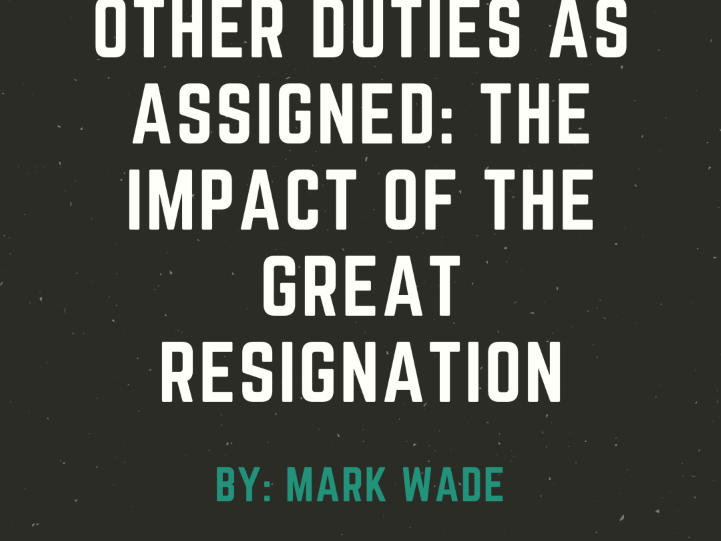
Other Duties as Assigned: The Impact of the Great Resignation
New Professionals and Graduate Students
January 4, 2022
For years, student affairs and higher education professionals have noted the attrition rates of new professionals, those with less than five years of experience, and, in part, graduate students. Attrition from the field of higher education, specifically within student affairs and similar functions, has been a point of conversation among human resource professionals and professionals within the field for decades. Typically these conversations have focused on the negative impact of attrition: planning a search, finding the right candidates, potentially repeating the process, etc. Lisa Lorden, in her 1998 article ‘Attrition in the Student Affairs Profession’ noted that career trajectory and industry movement in the United States was becoming increasingly more common. Since the publication of this article, changes have continued to occur. Some new professionals find opportunities in higher ed adjacent industries or maybe identify opportunities to utilize their passions outside of the context of traditional education.
Nevertheless, when attrition occurs there is a period of time where job responsibilities are reallocated to the remaining staff members. When these are reallocated, the final bullet point in our job descriptions come to life: “Other Duties as Assigned”. While only possessing these responsibilities in an interim capacity, many professionals feel overwhelmed and sometimes experience burnout. When COVID struck the world in 2019, people had no idea what would happen, how long the lockdown would be, how it would impact employment, what state and federal relief would look like, and the deep lasting personal impact that would be experienced. A recent article in Inside HigherEd entitled ‘Higher Education’s Role in the Era of the Great Resignation’ spoke to the experiences of people reevaluating their career trajectory and placing more value on their personal lives. People within all industries are looking for change and have seen what that change could be (i.e. virtual/remote work). The article went on to talk about how institutions of higher education can support academic endeavors for career changers.
Higher education, however, is not immune to the impact of the Great Resignation. The field continues to see new and entry level professionals leaving the field and the exacerbated financial impacts of COVID drives decision making on what positions are posted and what positions are placed on hold for filling. As such, professionals have been asked to hold onto job responsibilities for a longer period of time,and while some institutions have the financial means to temporarily compensate for this additional oversight, other institutions face the potential, or actual, resignation of staff that feel even more overwhelmed.
While this blog does not provide a full picture of the current impact being experienced in higher education or a measurement of practices being incorporated to support student affairs staff, it does call people to think about a few things.
-
Higher education administrators might be thinking about the amount of work that is being asked of all professionals and data collected from students about their experience. What services/programs/initiatives are currently in place that are not yielding the results we want and meeting the needs of our students that could be put on pause to help our staff’s wellbeing? High-level administrators are also conscious about the financial health and longevity of the institution, departments, offices, and divisions.
-
Managers of teams with many open positions might look at staff morale and how can we continue to boost the spirits of the current staff during a difficult time in their careers? Something as small as being able to wear jeans to the office can create a huge difference in morale.
-
Those leaving the field are probably experiencing internal conflict because at one point they loved higher education and are moving into something else. I always encourage people to develop relationships and it is important to think about the relationships being left behind and the people will be picking up your responsibilities as you transition out.
-
Professionals staying in the field and taking on more need to be able to identify their capacities. Young professionals tend to take on more and more as a means to show that they can do the work and one day become an amazing director. It is important to have an open and honest conversation with your peers and supervisor about where your capacities and abilities are and how that fluctuates.
There are many questions to be asked and answered, and many of us continuously engage in reflection about our careers, our paths, and how these align with our personal values and what we want from life. I encourage people to lean into critical conversations with their supervisors and themselves about what is best for them, and how we can provide the best experience for our students.
Author: Mark Wade currently serves as one of the Co-Chairs for the New Professionals and Graduate Students Steering Committee in NASPA and works full time as a Residence Hall Director at Bowling Green State University in Bowling Green, OH. Mark received his Master’s in Student Affairs Counseling in December 2018 and has embedded ideologies of self-authorship and self-creation within his work as a Hall Director and Co-Chair. Mark believes that it is important for all people to discover what truly matters to them.